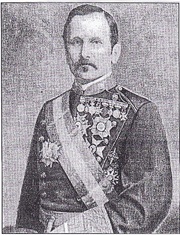
| Языки :: Испанский |
| Аудио |

 |
|
 |
|
46 |
Español |
Spanish |
|
Lección Dieciséis (16) |
||
| ¿Dónde? | Where? | |
| 1 |
Antes de hacer mi pregunta, me preparo, buscando palabras en el diccionario (1). |
Before putting [of do(ing)] my question, (I) prepare myself, (by) looking-up words in the dictionary. |
| 2 |
Veo que la señora vieja, que en este momento no habla, me mira con cierta curiosidad. Le preguntaré a ella. |
(I) see that the old lady, who at this moment does not speak, looks (at) me with a certain curiosity. (I) shall ask it to her. |
| 3 | Perdone señora, digo, haga el favor de decirme donde... (2). | Pardon me, madam, I say, will you please [do the favour to] tell me where... |
| 4 | ¿Usted as francés? | You are French? |
| 5 |
Sí, señora. Voy a Madrid. Busco una pensión, y quiero saber donde... |
Yes madam, (I) go to Madrid, (I) seek a boarding-house, and want to know where... |
| 6 |
¿Viene usted por sus negocios, o para aprender la lengua (3) ? |
Do you come for your [comes your H. for his] businesses] or to learn the language? |
| 7 |
Vengo para aprender la lengua. Puede usted indicarme donde... |
(I) come to learn the language. Can you indicate me where... |
| 8 |
No es difícil la lengua española. Se escribe tal como se habla (4). Aprenderá usted muy pronto. |
The Spanish language is not difficult. (It) is written [writes itself] just [such] as (it) is spoken [speaks itself]. You will learn very quickly. |
| 9 |
Lo espero, señora. He leído aquí un anuncio, pero no sé donde... |
(I) hope so [it] madam. (I) have read here an advertisement but (I) don't know where... |
| 10 |
El francés es mucho más difícil. Tiene tantas palabras que se escriben de un modo y se hablan de otro. Tengo un hermano que... |
French is much more difficult. (It) has so many words which are written [write themselves] in [of] one way, and are sounded [spoken] in another. (I) have a brother who... |
| EJERCICIOS | EXERCISE : | |
| 1 | ¿Qué hace usted esta tarde? | What do you do this afternoon? |
| 2 | Tengo mucho que hacer; y usted, ¿qué hace? | (I) have much [which] to do; and you, what do you do? |
| 3 | Nada de particular. Voy a buscar un piso para mi hermano. | Nothing [of] particular. (I) go to seek an apartment for my brother. |
| 4 | ¿Dónde vive ahora su hermano? | Where does your brother live now? [where lives now his (your H's) brother] |
| 5 | Vive en Burgos; pero vendrá a vivir aquí con su familia. | (He) lives in Burgos; but (he) will come to live here with his family. |
| 6 | ¿Quiere usted un piso con baño? | Do you seek an apartment with (a) bath-(room)? |
| 7 | Sí, si no es caro. | Yes, if (it) is not expensive, |
| NOTES. | |
| 1 | Hacer (pron. athair) is irregular; sent. 3 : haga : do (imperative). |
| 2 |
Decir, to say; yo digo, I say; el (or
usted) dice, he says, or you say; yo he dicho, I have said. By degrees we shall become familiar with those annoying irregular verbs. |
| 3 |
Por sus negocios, for his business[es] : this
is logical, since we speak in the third pers. : |
| 4 |
Se escribe, se habla : infinitives: escribir, hablar. Hence the different endings; same thing, sent. 10, in the plural. |
|
Piso (pron. peesso) means floor (storey) as well as
apartment, flat. In the latter sense, one also says : cuarto (cf. quarters). |
